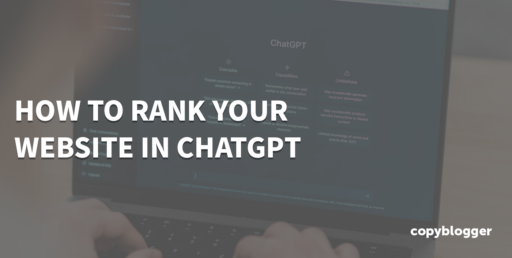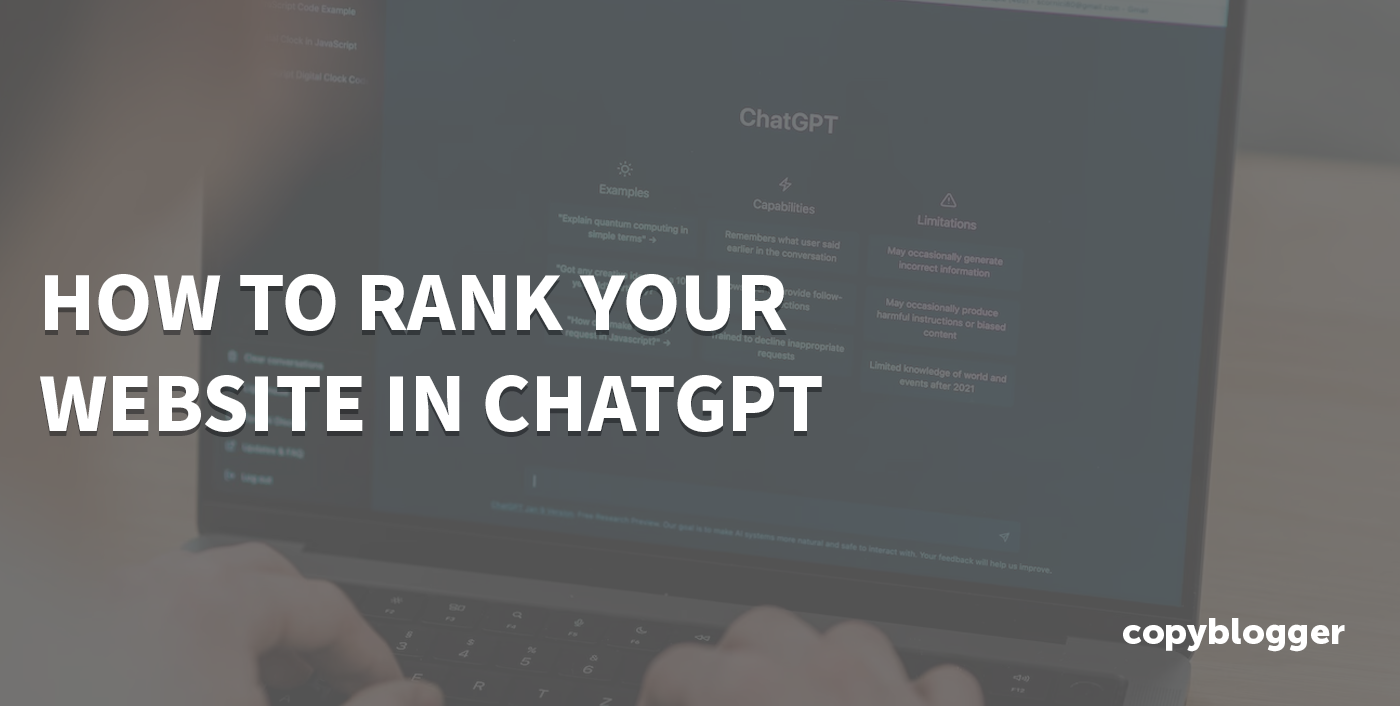Originally Posted on Copyblogger by Megan Mahoney
ChatGPT is stealing traffic from Google Search, and as a result, most websites are seeing a lower ROI from their SEO efforts.
Therefore, the solution to increase traffic and brand awareness is to rank in ChatGPT.
For example, if you have a recruiting firm, you want ChatGPT to mention your brand when someone asks, “What are the best recruiting firms?”
In this post, we’ll discuss the factors ChatGPT considers when selecting brands in its results and how you can rank your website in ChatGPT.
Want us to
scale your traffic?
For the first time, The Copyblogger methodology is now available to a select few clients. We know it works. We’ve been doing it since 2006.
How ChatGPT Ranks Websites
Neil Patel recently did a study analyzing over 80 different factors and found that these six factors strongly correlated with the brands ChatGPT ranks in its results:
- Brand Mentions: How frequently is the brand discussed on other websites?
- Reviews: How many third-party review platforms does the brand exist on (e.g., G2, TrustPilot, Yelp, etc.), and how many reviews does it have?
- Relevancy: Does the brand rank in Google for the keywords mentioned in the ChatGPT prompt (e.g., if the prompt is “what are the best accounting software platforms?” does the brand rank for “best accounting software” in Google search?).
- Age: Older, more established companies tended to appear more frequently in ChatGPT.
- Recommendations: How many other websites across the internet recommend that brand as a solution to the keyword in the ChatGPT prompt?
- Authority: How many social media followers does the brand have, and across how many platforms? How many backlinks does the website have?
Optimizing for each of these six factors is the key to ranking your website in ChatGPT.
Below, we’ll discuss several effective strategies to improve your website’s strength in these six areas.
How To Rank Your Website In ChatGPT
There are plenty of ways you can improve your website’s ranking in ChatGPT, but we selected the strategies below for a few reasons:
- Each strategy produces compounding results. Even as ChatGPT evolves, it will always optimize to show credible brands. These strategies focus on building your brand’s credibility, so they will continue to work even as ChatGPT evolves. And, building brand credibility is beneficial for other goals beyond ranking in ChatGPT, such as increasing conversions and earning more traffic.
- Each strategy is high impact. There are plenty of ways to improve brand credibility and rank in ChatGPT. Yet some strategies are much more impactful than others. So, instead of wasting your time with low-impact strategies, these are the ones that provide the most meaningful results.
We’ll also give you specific tips to make each strategy effective (and avoid key mistakes!).
1. Collaborate With Influencers
Collaborating with influencers is a great way to increase brand mentions because you’ll receive not only the benefit of their mention, but their followers will also likely share and discuss your brand.
These mentions are positive signals to ChatGPT that you’re an authority in the space, and it will also help more people learn about your brand.
The first step in influencer marketing is choosing the right influencer to partner with. Some factors to consider when selecting an influencer include:
- Relevancy: Is this influencer an authority in your niche? Or is only some of their content relevant to your niche?
- Audience size: How many total people in their audience are your ideal target audience? Note that only a small percentage of most macro influencers’ audiences match a brand’s ideal target audience.
- Audience loyalty: How much does the audience trust the influencer? You can usually determine this based on the comments. Additionally, influencers who respond to comments tend to have a much more loyal audience.
To find the best influencers to partner with, ask ChatGPT for a list of the biggest influencers in your industry. These are great potential partners because ChatGPT already considers them authority figures in your industry, so a mention from them would clearly boost your authority in the eyes of ChatGPT.
Here’s what it said when I asked it to provide a list of popular personal finance influencers:
Of course, the problem with this list of influencers is that most smaller and mid-sized brands won’t have the budget to work with them. To solve this problem, you can ask ChatGPT for a list of micro-influencers:
You can also ask it to provide a list of micro-influencers based on a specific platform (e.g., Instagram, YouTube, blog, etc.) or even a micro-niche (e.g., “personal finance influencers for moms”).
Another option for finding influencers is to use an influencer marketing platform. These platforms also allow you to see verified follower statistics and make it easy to handle the entire collaboration process, from content creation to payment.
Ranking Factors It Improves
- Brand Mentions
- Recommendations
- Authority
2. Publish Original Data Studies
You’ll notice that I linked to the data study published by Neil Patel because it provided helpful information that guides the content for this blog post.
Therefore, publishing helpful original data studies is a great way to earn more links, brand mentions, and general authority.
However, not all original research studies perform well.
This is because the most shared and linked-to original data studies should:
- Answer a frequently asked question by many people in your industry.
- The answer to that currently doesn’t exist.
- How critical is the answer to that question? Does the research provide actionable insights for next steps?
To show you how a good research idea versus a mediocre research idea, consider this graphic:
To help you determine what you should publish research on, write down a list of your strategy questions. Then, create research to answer those questions.
While surveys are one way to answer research questions, you can also simply gather existing data on the internet, similar to the Neil Patel data study.
Ranking Factors It Improves
- Brand Mentions
- Recommendations
- Authority
People are happy to share free tools with their friends, so offering a free tool is a great way to get more people talking about your brand online.
For example, Ahrefs offers a free Chrome Extension, and you can see that this tool has helped Ahrefs earn plenty of links and brand mentions:
Even if you lack the resources to hire a developer to build a free tool, you can also use spreadsheets to create simple calculators and templates.
Similar to the data studies, not all free tools are equally effective at attracting links and brand mentions.
To ensure your tool earns links and brand mentions, design it to solve a painful problem and ensure there aren’t already plenty of other free tools available that do the same thing.
For example, the Ahrefs Chrome extension solves several very painful problems – it allows users to see their competitors’ traffic, backlinks, and authority.
Additionally, it’s unrealistic for other brands to duplicate this tool and provide this data. The only reason it’s profitable for Ahrefs to provide this data is because it already captures this data for its paid product.
On the other hand, publishing a calculator that tracks macronutrients probably wouldn’t help your brand earn many links or mentions simply because many macro calculators already exist:
To create a tool, consider using proprietary data you already have and turn it into actionable information your target audience could use to solve a problem. You could also consider releasing a product feature for free.
Ranking Factors It Improves
- Brand Mentions
- Recommendations
- Authority
4. Build Partnerships/Affiliate Networks
Partnering with other brands or affiliates that already have your target audience is another great way to earn brand mentions and links.
To get started, look at other products and services your target audience frequently purchases.
For example, Kajabi is an online course platform, and its customers likely also purchase webinar software to run their course businesses.
Therefore, it would make sense for Kajabi to collaborate with a platform like Webinar Ninja.
Kajabi and Webinar Ninja’s hypothetical partnership could be structured like an affiliate program, where Webinar Ninja and Kajabi cross-promote one another’s products and provide an affiliate commission to the other whenever one of their customers purchases their products or services.
Alternatively, they could also publish a piece of content in collaboration with one another. For example, they could produce a video on how to generate more course sales where executives from both companies discuss how to use features in their respective tools to earn more sales.
Another option is to reach out to affiliate blogs and ask them to include your product or service on their lists.
For example, if you have a new dog toy, you could reach out to this website and ask them to include your product on their list of recommendations:
Alternatively, you could reach out to these websites and ask if they’d publish a full review of your product. Here’s an example of a review of the course platform Skool:
Ranking Factors It Improves
- Brand Mentions
- Recommendations
- Authority
5. Build a Personal Brand
Social media engagement appears to be a key signal that ChatGPT considers when ranking websites, yet most branded social media accounts have relatively low engagement.
This isn’t really a surprise, as most people use social media to connect with friends and other real people.
Therefore, rather than posting content from the branded social media account, post content from you or your executives’ personal social media accounts.
Then, you can occasionally sell your products/services through your personal account.
For example, Matt Gray has built an eight figure business primarily through his personal brand:
We have a separate resource on how to create a personal brand, but here are a few tips to consistently create excellent content that resonates with your audience:
- Identify your target audience: Who are they, and what are their pain points?
- Identify your expertise: What are problems your audience faces that you’ve solved? This is the foundation of your content topics.
- Draw from personal experience: How did you solve these problems? What are the systems and processes you use? What were the mistakes you made?
This will help you identify relevant content ideas and package it in a way that’s interesting to your audience. Once you have excellent content, it’s just a matter of posting content consistently.
Another tip to succeed on social media is to begin by focusing on just one platform (e.g., X, LinkedIn, Instagram). Then, block off a few hours each day or once per week to create content.
Ideally, try to post at least four times per week, though the more, the better.
It’s also important to respond to people when they comment on your posts. You can also send them automated DMs asking them more about problems they struggle with and what they want to learn from you. This is valuable audience research that can help inform your future topic ideas.
If you want more inspiration, you can view some of the best personal branding examples we’ve seen, and our analysis on each.
Ranking Factors It Improves
- Brand mentions
- Recommendations
- Authority
6. Produce Content Related To Your Core Keyword
If you’re already ranking well for your main keyword in search engines, ChatGPT appears to view that as a positive signal that you’re an authority on that topic and is therefore more likely to recommend your brand in its results.
Therefore, produce plenty of content (blog posts) related to your core industry keywords and optimize them to rank in search engines.
For example, let’s say you have a website about Disney and want to appear in ChatGPT’s results when someone asks, “What are the best Disney travel websites?”
In that case, writing blog posts about the best restaurants at Disney, the best hotels at Disney, and a packing list for Disney (and ranking in search engines for those topics) signals to ChatGPT that your website is an authority in the Disney travel space. As a result, you’re more likely to rank in ChatGPT’s results.
It may seem counterintuitive to produce content to rank in Google Search when ChatGPT is stealing traffic, though ranking your content in Google Search appears to be essential for ranking in ChatGPT.
Additionally, if you have an interesting opinion or unique response to any of these related topics, there’s a good chance that other people will organically share the content, helping you earn more brand awareness and reach.
While you can use a keyword research tool to identify topic clusters, the best strategy is to talk to your audience and ask them about content topics they want you to cover.
Ranking Factors It Improves
7. Speak at Events
Speaking at events is an easy way to signal to ChatGPT (and your target audience) that you’re an authority on the topic at hand, as you’ll earn brand mentions from the website hosting the event, and other brands affiliated with the host will also probably share information on the speakers.
Here’s a great example of BrightLocal promoting its speakers:
Additionally, you can record the keynote speech and then repurpose it across social media and your other content channels to earn even more brand mentions.
Speaking at events is also a great way to connect with your target audience and drive direct sales.
You probably already have a rough idea of the most popular conferences in your industry, and many of them allow you to apply to speak through a traditional application process.
You can also apply to speak at local and online summits.
Or, consider hosting your own event.
For example, reach out to the hosts of Slack groups or Facebook groups and offer to do a webinar or Q and A session. Most of these group leaders want more methods to engage readers, and hosting an online event for them is an easy way to accomplish this.
Ranking Factors It Improves
- Brand Mentions
- Relevancy
- Recommendations
- Authority
8. Buy Existing Domains
ChatGPT also appears to consider brand age when ranking its results, but how can you make your website older?
One easy way to accomplish this is to purchase existing websites and redirect them to your website.
For example, Epic Gardening is one of the largest blogs about gardening, and to expedite its growth, the founder purchased another gardening blog and redirected the traffic to the Epic Gardening domain. While his goal wasn’t necessarily to increase the age of the blog, it did help significantly improve Epic Gardening’s authority.
Yet before you start buying websites, it’s important to buy the right websites.
Here are a few things to analyze as you’re evaluating different websites:
- Traffic/rankings
- The percentage of content relevant to your site
- The quality of the content
- Domain authority/links (and link quality/relevancy to your niche)
So, where do you find these websites?
The highest-quality websites are usually only purchased through private sales. For example, the founder of Epic Gardening, Kevin, simply contacted the owner of Income Jar (the blog they purchased) and asked if they’d be willing to sell.
So research the keywords you want to rank for and then reach out to the smaller websites already ranking for those keywords.
For example, if you have a blog about dogs, these might be excellent websites to acquire:
Another option is to browse websites like Quiet Light and Flippa to find blogs for sale, though your options on these sites will likely be much more limited.
Ranking Factors It Improves
9. Guest Blogging
If you write a guest post on another authoritative website in your niche and mention your own website within that post, ChatGPT will recognize that as a positive signal that your website is also an industry authority.
Yet there are two problems with guest blogging:
- Blog owners are often overwhelmed with guest post requests and ignore most outreach emails.
- Ranking any new blog post in Google Search can be challenging, so there’s a good chance your new guest post won’t receive any traffic.
While any mention of your brand is better than nothing, writing a blog post on another website that doesn’t receive any traffic isn’t the best use of your time.
The good news is that guest blogging can still be effective if you use a slightly different strategy.
First, instead of reaching out to any website in your niche, start by Googling a keyword you want your website to rank for in ChatGPT. For example, if you have a CRM for real estate agents, search the term “CRM for real estate agents.”
Then, reach out to the top ranking websites and offer to update the entire blog post for them as long as you can include your website as one of the options.
This is a win-win situation because they’ll rank higher if you update the post for them, and you’ll also earn a valuable brand mention from an authoritative website.
Another effective guest posting strategy is to reach out to other brands in your niche that offer a parallel product. For example, if you offer a CRM for real estate agents, you could reach out to marketing agencies that work with real estate agents and offer to write a guest post on how real estate agents can set up a CRM to close leads more effectively.
You could also offer to do a guest post exchange and allow the marketing agency to write a post on your blog about how to create a marketing engine to attract more real estate leads.
This way, you’re not only receiving the benefit of a mention on another website in your industry, which will help you improve your ChatGPT rankings, but it also gets you in front of your ideal target market.
Ranking Factors It Improves
- Authority
- Brand Mentions
- Relevancy
- Recommendations
10. Run a Review Campaign
Reviews are not only a positive signal to search engines and ChatGPT that your brand is a credible business, but they’re also excellent for increasing conversions and general branding.
To earn more reviews, you can create an email sequence asking customers to leave a review.
The key to earning great reviews is to pinpoint when customers receive the most value from your product or service. Then, send an automated email at that moment asking for a review.
For example, if you have a plumbing company, schedule an automated email to send to customers as soon as their service is completed.
If you have accounting software, schedule an automated email to send at the end of a customer’s first month using the product when they experience how much easier it is to close the books.
Here’s sample email you could send to customers:
A key reason many people don’t write reviews is because they don’t know what to say, so including specific things customers can mention in reviews, such as customer service, ease/efficiency, and product/service quality is a great way to increase the volume of reviews.
Ranking Factors It Improves
- Reviews
- Authority
- Recommendations
Get More Help Ranking Your Website In ChatGPT
ChatGPT is still evolving, and while the exact factors it analyzes to determine which websites to list in its results may change, it’s always optimizing to show the most reputable brands.
As all of these tactics are designed to improve your brand’s general authority, they will continue to work well into the future, even as ChatGPT evolves.
However, we’re also constantly monitoring ChatGPT’s evolution to stay up to date with how it ranks websites in its results.
If you want more hands-on help to grow your business or side hustle, consider joining the Copyblogger Academy, where you can ask seven figure founders Tim Stoddart and Charles Miller any of your questions. The Copyblogger Academy is a course and community, and just a few of its highlights include:
- Nine marketing courses on topics like SEO, personal branding, copywriting, email marketing, and more.
- Accountability meetings with seven figure founders Tim and Charles
- Access to exclusive interview recordings with seven and eight figure entrepreneurs
- Connection and collaboration opportunities with other side hustlers and entrepreneurs in the community
- And much more
You can join the Copyblogger Academy today risk-free to see if it’s the right fit for you. If you aren’t 100% satisfied, we’ll give you a full refund within the first 30 days.






